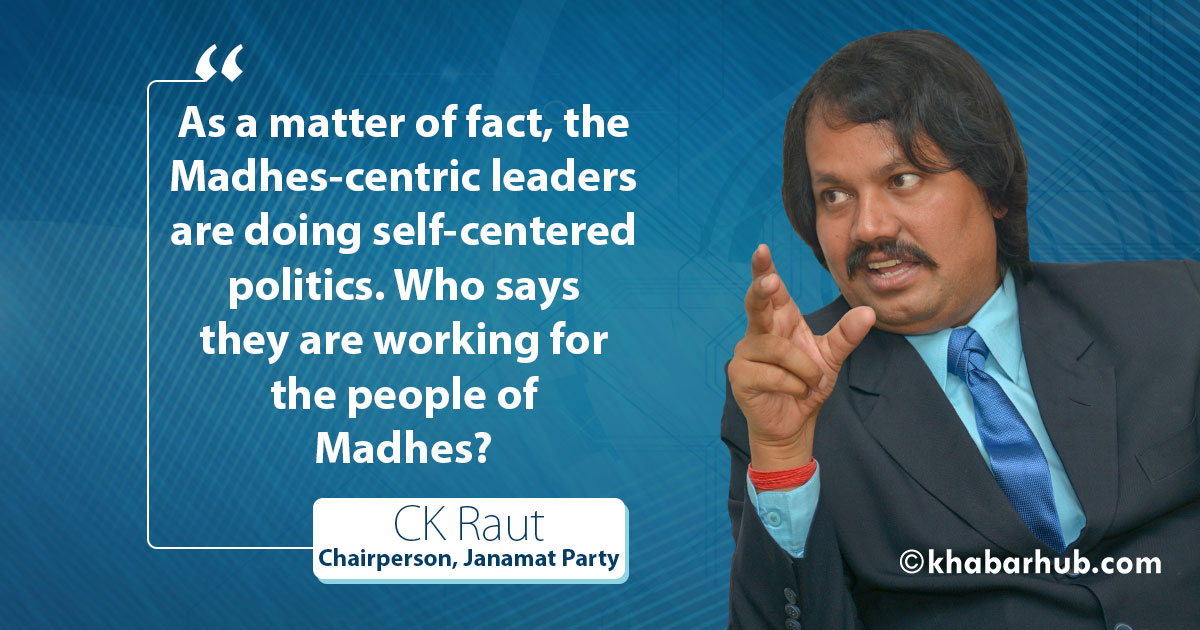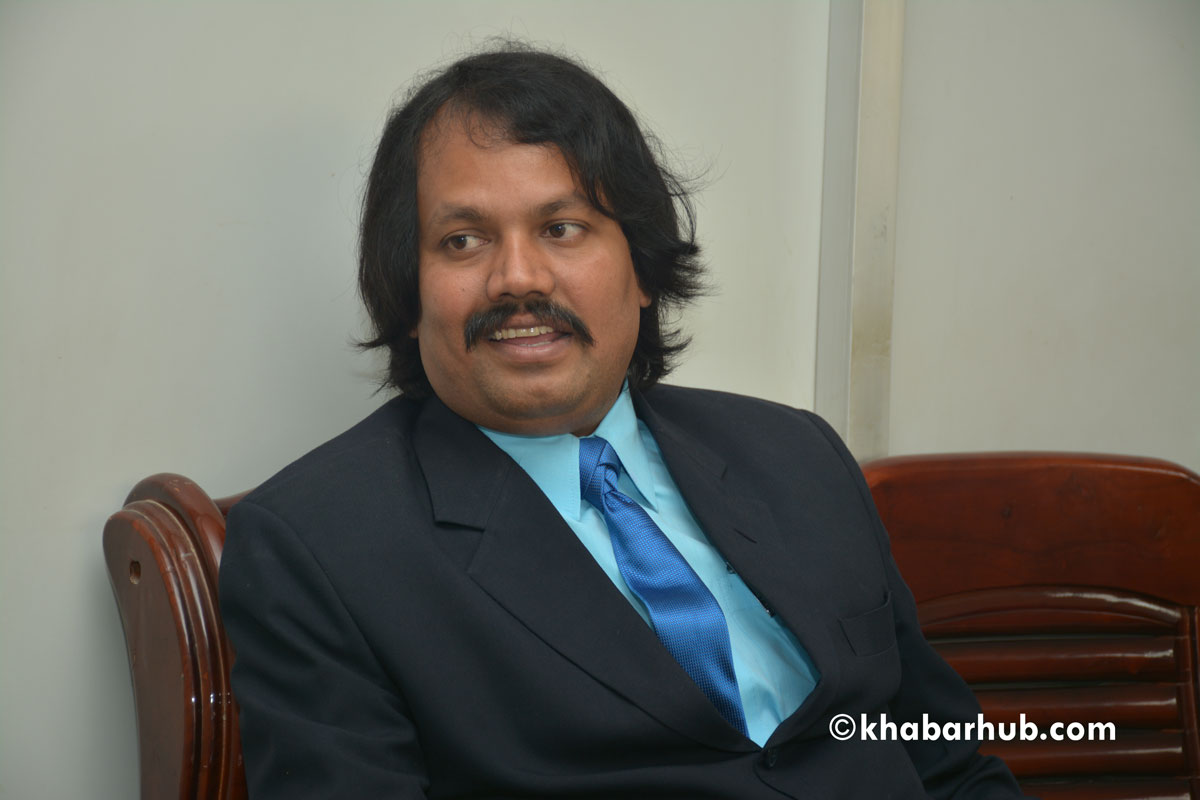0%
Prime Minister KP Oli is an intelligent, visionary and far-sighted leader. Therefore, we are very much hopeful our demands would be addressed.

CK Raut, previously recognized as a secessionist leader, voiced for an independent Madhes. Raut was arrested and released time and again on the charge of sedition. He joined mainstream politics by signing an 11-point agreement with the Nepal Government recently and subsequently registered Janamat Party at the Election Commission. Born in a humble family in Mahadeva village of Saptari district, he is a Ph.D. holder from Cambridge University. Experts have construed it as a strategic move to turn the tables in his favor while some have described it as a surrender. Amid growing speculations, Khabarhub caught up with Raut for his first-hand information. Excerpts:
You joined mainstream politics by signing an 11-point agreement with the KP Oli-led government by relinquishing your agenda of Independent Madhes. You have registered a Janamath Party at the Election Commission. Some people suspect your connection with the United States of America. Could you clarify it?
I was born in a humble family in Mahadeva village of the Saptari district. I did my SCL from a nearby school located in Katti village. I completed my Bachelors in Engineering from the Institute of Engineering, Pulchowk. I did my Ph.D. from Cambridge University, London before I moved to America for a job.
Back in 2000, the ‘Hrithik Roshan incident’ that took place in Nepal touched me badly, and invigorated me to know and understand the historical background of the people in Madesh. I then founded the Alliance for Rights of Independence of Madhes (ARIM) while I was studying at Cambridge. We then established a digital library in Madhes. Therefore, what I want to clarify that the agenda of independent Madhes did not come out of the blue.

You were enjoying hefty pay and perks while working as a first-rate computer scientist in the United States of America. Why did you return to Nepal?
In fact, my feelings were always with Nepal even though I was away from home. One day a couple of Madhesi leaders came to Boston to take part in training. We met in a restaurant. They told me about the worrying situation in Madhes. By the time I had earned some money. I always wanted to do something to uplift the living standard of the Madhesi people. I then returned home. In order to take stock of the living condition of the Madhesi people, I toured the entire Tarai region from Mechi to Mahakali and made a documentary. My conscience told me to stay back in Nepal and work for the Madhesi people since my homeland was desperately in need of me. People of Madhes were suffering from hunger, and deprived of political rights.
Some self-proclaimed patriots labeled you of being a secessionist until you signed an agreement with the Oli-led government. You had been voicing for Alliance for Independent Madhes. What incited you to take a U-turn to join mainstream politics?
Independent state is not the goal in itself. The ultimate goal is to achieve prosperity, happiness, and security for the people. Madhesi society was facing discrimination, inequality, and poverty. The media described our movement as an act of secession. However, our perception was different than what was widely understood. At one point, we thought if the problems were resolved through some other means, why do we need to go for Independent Madhes. We then put forth it as a proposal. However, the ultimate goal of prosperity and happiness should not change. Therefore, we signed an agreement.
Some political parties construed your joining mainstream politics as a political stunt. Some took it as a government’s strategy to reduce the size of the Madhes-based parties. What is your observation?
The fact that thousands of educated youths – future leaders — have supported the movement should not be forgotten. Everybody can presume what kind of impact these leaders will have on the nation when they come to the forefront. The government, I assume, has taken it as a preventive measure. I would label it as a farsighted and wise decision. The signing of the 11-point agreement has created a win-win situation for both sides.
How optimistic are you that the incumbent government would address your demands?
The government led by K P Oli holds a two-thirds majority. It is all powerful. Candidly speaking, Prime Minister Oli is an intelligent, visionary and far-sighted leader. Therefore, we are very much hopeful our demands would be addressed.
Some Madhes-based leaders allege you of being belligerent towards Province 2 government. Your issue is with the central government with whom you signed the agreement. Do you think your demands would be fulfilled by chiding the Province 2 government?
I am, in fact, concerned with the activities of the Province 2 government since I belong to Janakpur. The country is keeping close tabs on the activities there. It’s been a political-centric, and it is not unusual. Moreover, a budget of Rs 80 to 100 million have been allocated for a local unit annually. Monitoring of how this budget is being spent is a must to prevent it from being misused. I joined politics to ensure cultural, economic, social and political rights to the people. The provincial government cannot escape by blaming the central government. They should be held accountable. Corruption should be abolished. My point is that the country should listen to the voice of the Madhesi people in general, not only the Madhes-based leaders.
Madhes-centric leaders have constantly raised the issue of Madhes. The people of Madhes voted them and they are now at the policy-making level. However, the living standard of the people of Madhes has not changed. What went wrong?
As a matter of fact, Madhes-centric leaders are doing self-centered politics. Who says they are doing politics to bring about changes in the lives of people of Madhes? Their intention is to cling on to power for which they can go to any extent, use political discourse, and talk about deprivation of rights and discrimination, but do not work for the people.
What about your independent movement now? Has it come to an end? What about the agenda of a referendum?
As I said earlier, our ultimate goal is to attain prosperity, equality, happiness, and discrimination-free society. We will use this multi-party democratic tool to realize these goals. Currently, we are in a wait and see position. If this tool fails to prove instrumental in achieving our goal, people will review it and take another decision. Moreover, holding a referendum is not a big issue, it’s constitutional.